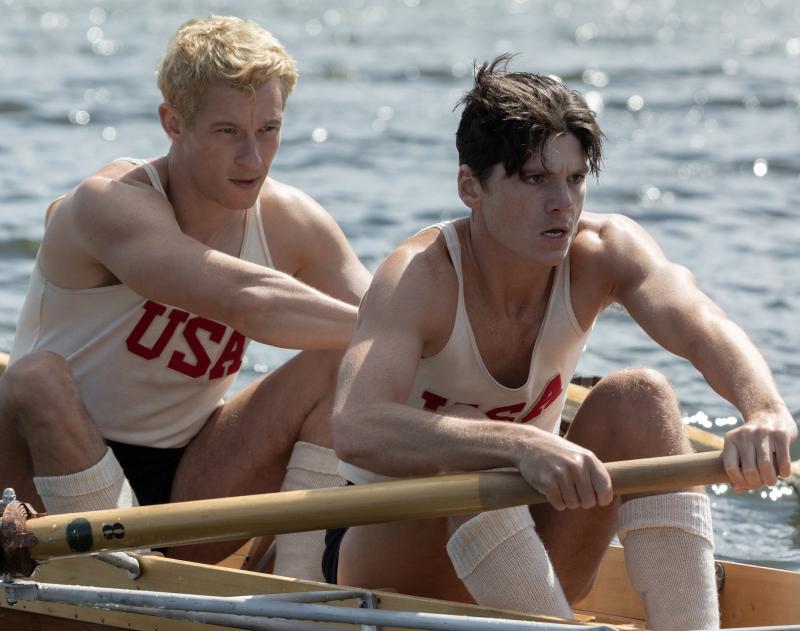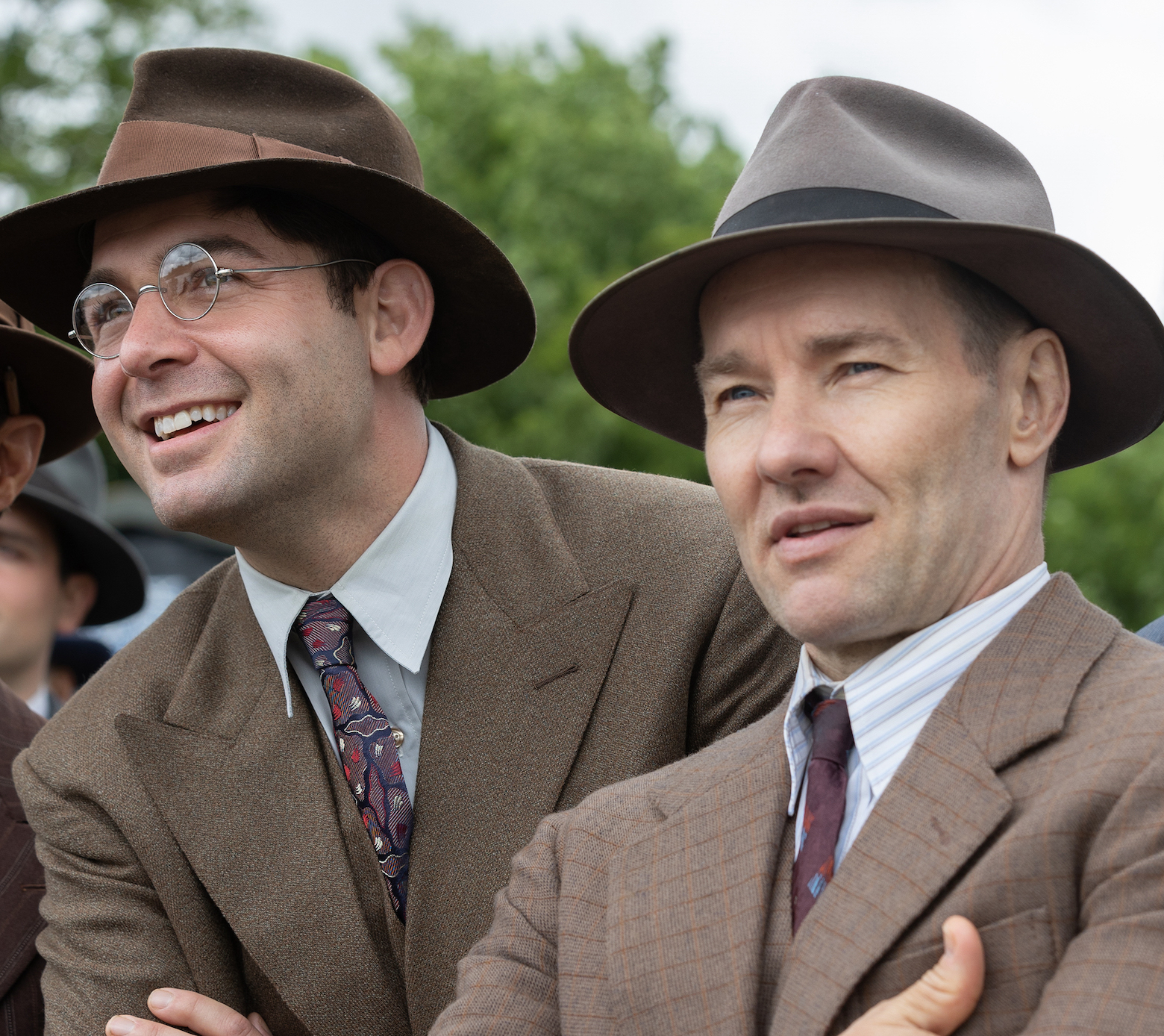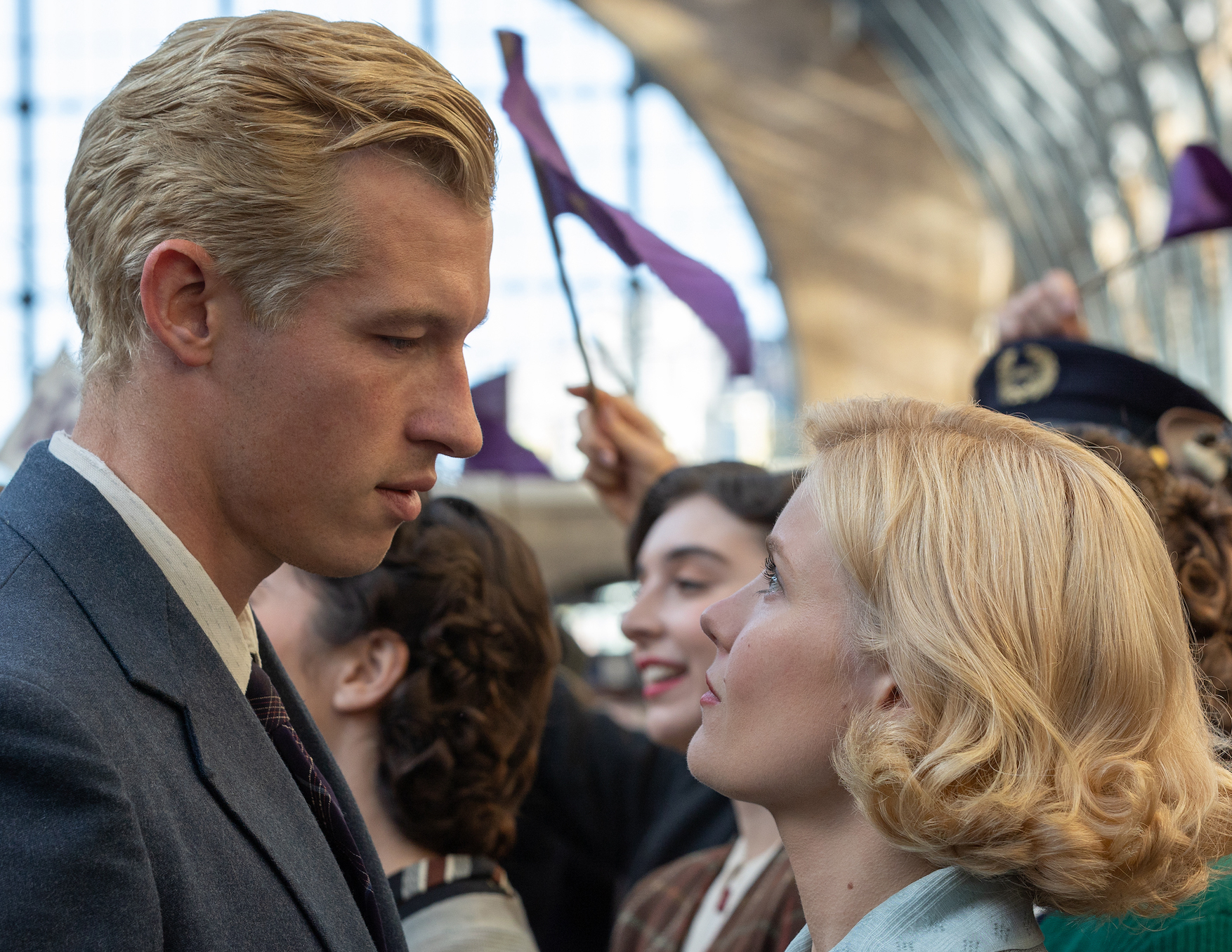The Boys in the Boat review - a Boy’s Own true story told in formulaic style | reviews, news & interviews
The Boys in the Boat review - a Boy’s Own true story told in formulaic style
The Boys in the Boat review - a Boy’s Own true story told in formulaic style
George Clooney’s latest is a highly predictable shoutout for the underdog

Seabiscuit, Creed, Rocky, The Full Monty, Chariots of Fire… George Clooney’s latest directorial project is in the same vein as these earlier films, but swap Seabiscuit et al for a rowing eight.
All have a format film-makers love because they know it will jerk a tear from anybody who loves a saga about an underdog, especially if it’s true. The Boys in the Boat is based on a 2013 bestselling account by David James Brown (co-writer on the film) of the US rowing eight’s bid for glory at the Berlin Olympics in 1936. The date is significant because the historical context allows the boys in the boat to serve as proxies for weighty roles beyond their sporting one.
 The setting is Seattle, Washington, where Joe Rantz (Callum Turner), a young man living in a burnt-out jalopy, dining on crisps and stuffing his worn out boots with newspaper to block the holes, is struggling to survive. He stands with scores of others in the mornings, waiting for a day’s work, but despite his strong physique is not hired, and the college where he is studying to become an engineer is insisting he pay his tuition fees. HIs equally hard-up friend Roger Morris (Sam Strike) encourages him to try out with him for the University of Washington rowing eight – which will provide them with accommodation and a paying job while they are in the crew. Of course, they slog their guts out in the trials, sometimes literally (vomiting is a regular hazard in competitive rowing), but they make it, along with seven other impoverished students.
The setting is Seattle, Washington, where Joe Rantz (Callum Turner), a young man living in a burnt-out jalopy, dining on crisps and stuffing his worn out boots with newspaper to block the holes, is struggling to survive. He stands with scores of others in the mornings, waiting for a day’s work, but despite his strong physique is not hired, and the college where he is studying to become an engineer is insisting he pay his tuition fees. HIs equally hard-up friend Roger Morris (Sam Strike) encourages him to try out with him for the University of Washington rowing eight – which will provide them with accommodation and a paying job while they are in the crew. Of course, they slog their guts out in the trials, sometimes literally (vomiting is a regular hazard in competitive rowing), but they make it, along with seven other impoverished students.
From here, with an Alexandre Desplat score that moves between a light tinkling piano and jingoistic trad jazz setting the tone, you can predict the pacing and structure of the film almost down to the minute: the hard-scrabble training, the joy of being selected and doing even more hard-scrabble training; then the first test, taking on the University of California seniors (Joe’s team are in the junior boat) at the Poughkeepsie Regatta, before the Big One, competing in the Nazi-showcase Olympics, under the eagle-eye of the Führer himself.
These poor young men first have to be the sporting heroes their college needs to raise alumni donations. Then they segue into representing the aspirations of post-Depression America, pitted against privileged students in the boats from top colleges – as one florid radio commentator (Chris Diamantopoulos) puts it, those with old money versus those with none at all. That’s just the appetiser. When the US Olympic team organisers tell the boat’s coach, Al Ulbrickson (Joel Edgerton, pictured above with James Wolk as Coach Bolles), his team will have to fund their own bid in Berlin, they are then forced to stand in for the whole nation, winning hearts and cash pledges from around the country as the gallant young of America, home of the brave.
None of them is from any kind of ethnic minority, but the script handily puts them at the opening ceremony near the Black athlete who will incense Hitler by winning three golds, Jesse Owens; he sets them straight when one says to him, isn’t it great to be running against the world? No, he says, he is trying to impress “the folks back home”. The R-word is not used but heavily implied.
It’s basically a good yarn, but it emerges as the kind of soft-centred crowd-pleaser that sends you rushing for proof of its authenticity. Sure enough, the film’s time span, one year from recruitment to Olympics, turns out to be two years less than the time it actually took the eight to reach peak condition. Which doesn’t really matter that much. But other little grace notes in the script are fabrications, such as the impressive generosity of the rival “Cal” boat’s coach and the final’s photo finish.
 The cast, many of them British, are a good physical match for the real people they are playing, and have been drilled hard to row authentically too, which gives their performances extra piquancy. There are lovely turns from Jack Mulhern as the crew’s introverted pacemaker, Don Hume, and Luke Slattery as the mischievous cox, Bobby Moch, who has to steer his crew to victory with a tin megaphone strapped to his face. His maverick manoeuvres add much needed zing to the races, where you can feel the editing trying to wring excitement from the uniform motions of the rowers.
The cast, many of them British, are a good physical match for the real people they are playing, and have been drilled hard to row authentically too, which gives their performances extra piquancy. There are lovely turns from Jack Mulhern as the crew’s introverted pacemaker, Don Hume, and Luke Slattery as the mischievous cox, Bobby Moch, who has to steer his crew to victory with a tin megaphone strapped to his face. His maverick manoeuvres add much needed zing to the races, where you can feel the editing trying to wring excitement from the uniform motions of the rowers.
But half the boys in the boat go unexplored, and the film overall has almost too many characters, robbing the key ones of screen time and depth. Turner’s Joe is given only just enough to do to justify being the leader of the pack, such as a romance with a pert blonde, Joyce (Hadley Robinson, pictured above with Callum Turner), from his high-school days, who rather mystifyingly turns up in his engineering lectures, along with a remarkable number of other women students. If only.
He is also given a brief encounter with the insouciant father who abandoned him at 15 (Alec Newman), there to add ballast to his character, presumably. In loco parentis, he has the creator of his boat, an Englishman called George Pocock (Peter Guinness), whom he helps lovingly stroke the surface of the boat with sandpaper and oil. Guinness is a Shakespearian player of some renown, and his fruity tones and commanding presence are balm here – until he has to deliver a ham-fisted homily to Joe the night before the Olympic final that even he can’t quite make sing.
Meanwhile, the fine Australian actor Joel Edgerton, playing the crew’s coach, has only the usual motions to go through as a driven man who drives others to the brink, though not over the edge. It all slips down easily, but perhaps a little too easily.
The future of Arts Journalism
You can stop theartsdesk.com closing!
We urgently need financing to survive. Our fundraising drive has thus far raised £49,000 but we need to reach £100,000 or we will be forced to close. Please contribute here: https://gofund.me/c3f6033d
And if you can forward this information to anyone who might assist, we’d be grateful.

Subscribe to theartsdesk.com
Thank you for continuing to read our work on theartsdesk.com. For unlimited access to every article in its entirety, including our archive of more than 15,000 pieces, we're asking for £5 per month or £40 per year. We feel it's a very good deal, and hope you do too.
To take a subscription now simply click here.
And if you're looking for that extra gift for a friend or family member, why not treat them to a theartsdesk.com gift subscription?
more Film
 Bugonia review - Yorgos Lanthimos on aliens, bees and conspiracy theories
Emma Stone and Jesse Plemons excel in a marvellously deranged black comedy
Bugonia review - Yorgos Lanthimos on aliens, bees and conspiracy theories
Emma Stone and Jesse Plemons excel in a marvellously deranged black comedy
 theartsdesk Q&A: director Kelly Reichardt on 'The Mastermind' and reliving the 1970s
The independent filmmaker discusses her intimate heist movie
theartsdesk Q&A: director Kelly Reichardt on 'The Mastermind' and reliving the 1970s
The independent filmmaker discusses her intimate heist movie
 Blu-ray: Wendy and Lucy
Down-and-out in rural Oregon: Kelly Reichardt's third feature packs a huge punch
Blu-ray: Wendy and Lucy
Down-and-out in rural Oregon: Kelly Reichardt's third feature packs a huge punch
 The Mastermind review - another slim but nourishing slice of Americana from Kelly Reichardt
Josh O'Connor is perfect casting as a cocky middle-class American adrift in the 1970s
The Mastermind review - another slim but nourishing slice of Americana from Kelly Reichardt
Josh O'Connor is perfect casting as a cocky middle-class American adrift in the 1970s
 Springsteen: Deliver Me From Nowhere review - the story of the Boss who isn't boss of his own head
A brooding trip on the Bruce Springsteen highway of hard knocks
Springsteen: Deliver Me From Nowhere review - the story of the Boss who isn't boss of his own head
A brooding trip on the Bruce Springsteen highway of hard knocks
 The Perfect Neighbor, Netflix review - Florida found-footage documentary is a harrowing watch
Sundance winner chronicles a death that should have been prevented
The Perfect Neighbor, Netflix review - Florida found-footage documentary is a harrowing watch
Sundance winner chronicles a death that should have been prevented
 Blu-ray: Le Quai des Brumes
Love twinkles in the gloom of Marcel Carné’s fogbound French poetic realist classic
Blu-ray: Le Quai des Brumes
Love twinkles in the gloom of Marcel Carné’s fogbound French poetic realist classic
 Frankenstein review - the Prometheus of the charnel house
Guillermo del Toro is fitfully inspired, but often lost in long-held ambitions
Frankenstein review - the Prometheus of the charnel house
Guillermo del Toro is fitfully inspired, but often lost in long-held ambitions
 London Film Festival 2025 - a Korean masterclass in black comedy and a Camus classic effectively realised
New films from Park Chan-wook, Gianfranco Rosi, François Ozon, Ildikó Enyedi and more
London Film Festival 2025 - a Korean masterclass in black comedy and a Camus classic effectively realised
New films from Park Chan-wook, Gianfranco Rosi, François Ozon, Ildikó Enyedi and more
 After the Hunt review - muddled #MeToo provocation
Julia Roberts excels despite misfiring drama
After the Hunt review - muddled #MeToo provocation
Julia Roberts excels despite misfiring drama
 London Film Festival 2025 - Bradley Cooper channels John Bishop, the Boss goes to Nebraska, and a French pandemic
... not to mention Kristen Stewart's directing debut and a punchy prison drama
London Film Festival 2025 - Bradley Cooper channels John Bishop, the Boss goes to Nebraska, and a French pandemic
... not to mention Kristen Stewart's directing debut and a punchy prison drama
 Ballad of a Small Player review - Colin Farrell's all in as a gambler down on his luck
Conclave director Edward Berger swaps the Vatican for Asia's sin city
Ballad of a Small Player review - Colin Farrell's all in as a gambler down on his luck
Conclave director Edward Berger swaps the Vatican for Asia's sin city

Add comment